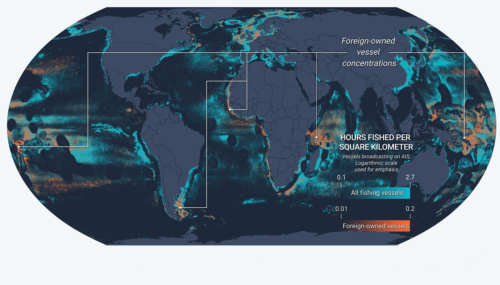Meaningful ocean action is needed to achieve Sustainable Development Goal 14, says United Nations Ambassador
Ambassador Peter Thomson, United Nations Secretary General’s Special Envoy for the Ocean, addresses the importance of transparency and technology to achieve SDG-14.
The world is at a standstill. Over the last few months, COVID-19 has challenged health systems, crippled economies, and put our most vulnerable at risk. The pandemic has impacted almost every community worldwide, leaving us uncertain about what the future holds. It is no surprise that close to all ocean-related events throughout 2020 have been postponed. What was once presumed a ‘super year’ for the ocean is now a time to reflect on environmental prospects and explore how we can build back better.
It is more critical than ever that we strive to safeguard the food security of billions who rely on fish for their primary source of protein, which can only be achieved through sustainable management. Global Fishing Watch recognizes the need to put cost-effective solutions in place that will support fisheries management bodies and ensure future ocean resilience.
In the absence of this year’s global meetings, we sat down with Peter Thomson, United Nations Secretary General’s Special Envoy for the Ocean, to discuss the need for continued momentum in the push to implement Sustainable Development Goal (SDG) 14 – the conservation and sustainable use of our ocean.
This interview has been edited for length and clarity.
Q: What is the biggest obstacle preventing the implementation of SDG 14?
A: The fundamental challenge facing human beings on planet Earth is the escalating level of our greenhouse gas emissions. They are the cause of the climate crisis and they are the reason the ocean is acidifying, deoxygenating, and warming – and warming results in the death of coral, rising sea levels, and changing marine ecosystems. To this challenge, we must add the effects of detrimental human behavior in the fields of marine pollution, stemming mostly from land-based activities, and some of our fishing habits – notably overfishing, illegal fishing, and the subsidization of industrial fishing fleets.
Q: How can innovation and technology address some of these challenges?
A: The Intergovernmental Panel on Climate Change has made it clear that rapid, far-reaching, and unprecedented changes in all aspects of society will be required if we are going to succeed in limiting global warming to 1.5 degrees Celsius. This will require political will at all levels of society. Be it climate action, pollution control, or fisheries management, there can be little doubt that the application of our best innovation and technology will be key to our success.
Q: How would global fisheries transparency help achieve SDG 14?
A: SDG 14 requires us to conserve and sustainably use the ocean’s resources, and global fisheries transparency will be one of the necessary tools to get there. Transparency requires the sharing of information, and in the year 2020, this must be done through digitalization of information of both fishing and fishing-related activities, and the efficient global exchange of that information.
Q: How can communities around the world take appropriate ocean action to maintain momentum this year?
A: The SDGs and the Paris Climate Agreement are the agreed universal plan. For the sake of our children and those who come after them, we must all stick to the plan. SDG 14 has ten targets – we have to implement them all, without exception. Everything is connected and there can be no healthy planet without a healthy ocean.
Q: In the wake of a global pandemic, how can the ocean aid us in our recovery?
A: The ocean is the mother of all life on this planet and it will sustain us if we give it the respect it deserves. It will feed us, give us our medicine and provide our renewable energy. But we have to treat it right and cease our polluting and harmful ways. The blue-breen recovery road lies ahead, and we must choose it over the solicitations of the grey one that takes us back to where we were.
Q: Are you optimistic about the future of ocean governance?
Yes, but optimism is not enough. Our success will be more about the hard-headed yet pragmatic pursuit of action to reverse the decline of the ocean’s health. I see this every day. Working with ocean action communities around the world, it’s abundantly clear they’re never giving up on the struggle against avarice and mismanagement. There will be no surrender, ever, from our moral obligation to conserve and sustainably use the ocean’s resources.
Society has always depended on the ocean, and it will continue to do so in these exceptionally challenging times. Now, we will be all the more reliant upon life below water for our financial and food security, maritime transport, and security amid the global climate emergency. As communities adapt to these formidable circumstances, the importance of nature is more evident than ever.
Courtney Farthing manages the transparency program at Global Fishing Watch.

